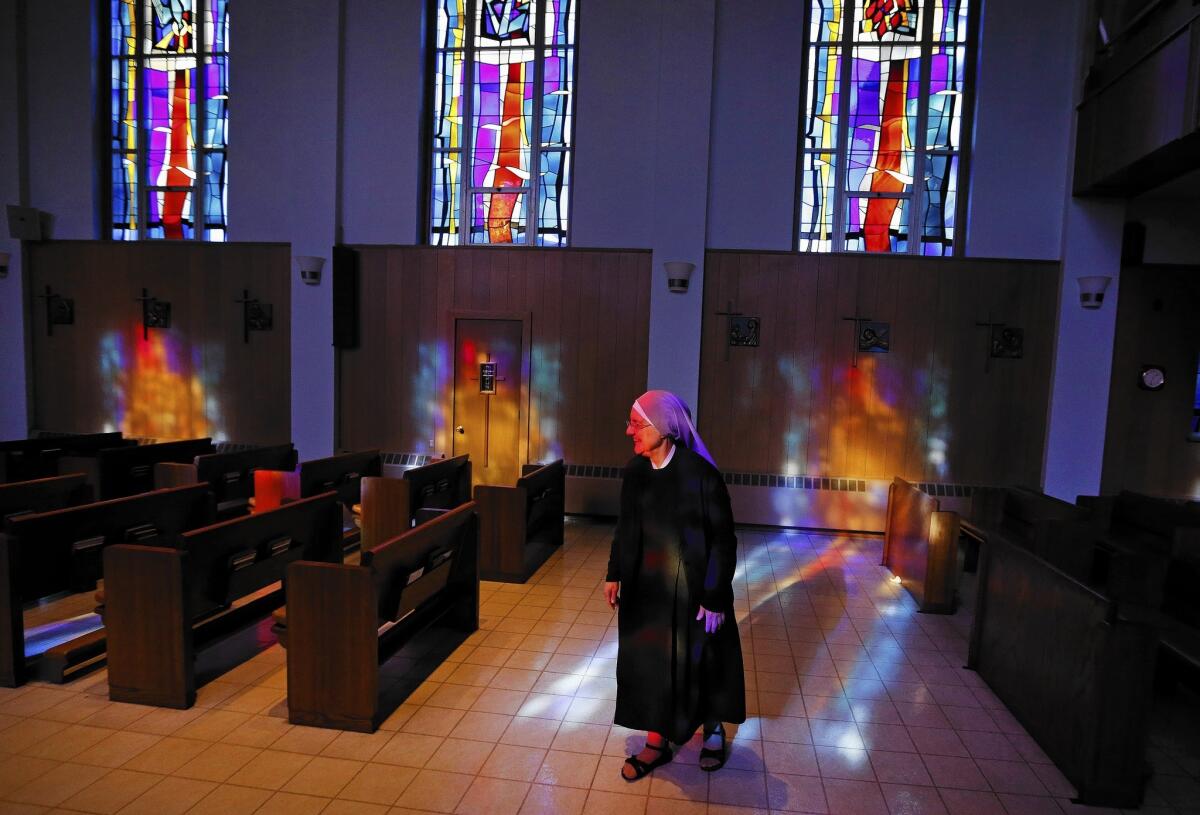Obamacare lawsuit forces order of nuns into the public eye

- Share via
People recognized St. Jeanne Jugan by the begging basket she carried while walking down the roads of Brittany, in northwest France, in the late 18th and early 19th centuries.
Going from door to door, Jugan would ask people for money, gifts — whatever they could spare for the elderly poor.
Nearly 175 years later, nuns from the religious order Jugan founded, the Little Sisters of the Poor, can still be seen in public, collecting donations to support their work. Unlike some nuns who wear casual clothing these days, the Little Sisters dress in traditional garb, in all white or black habits with gray veils.
Except for their soliciting of donations, the members of the “begging order,” as it’s sometimes known, have largely stayed out of the spotlight. But that changed in September when the order became one of the plaintiffs in a lawsuit filed against the so-called contraceptive mandate of the Affordable Care Act, placing them at the center of a debate over healthcare and religious freedom.
The nonprofit gained even more public attention when U.S. Supreme Court Justice Sonia Sotomayor granted a last-minute temporary injunction Dec. 31, giving the sisters a short reprieve from the requirement.
The sisters, who are among 45 religious groups fighting the legislation, take issue with an element of the law that requires all employers — regardless of religious affiliation — to provide insurance coverage for contraception to workers. For the sisters, that would include employees at 29 homes they operate for the elderly in cities across the United States, including Los Angeles, Chicago and Baltimore.
The order’s “entire reason for being is to serve the poor and elderly,” said Robert Destro, a professor of law at the Catholic University of America.
So why join a widely watched legal battle?
“They didn’t think they had any other choice,” said Daniel Blomberg, senior counsel at the Becket Fund for Religious Liberty, a nonprofit public-interest law firm dedicated to protecting the free expression of religious traditions. The Little Sisters approached the Becket Fund about possible legal action, and the firm filed suit on behalf of the order’s home in Denver, which has 60 employees who are not nuns.
Blomberg said the sisters had two options: Provide coverage for contraception to their employees, in violation of their Roman Catholic beliefs, or pay hefty tax fines for failing to comply with the law.
The Obama administration offered church-related organizations, including the Little Sisters, an accommodation, allowing them to opt out of the mandate if they signed a self-certification form.
The compromise would mean the sisters would not have to provide contraceptive coverage themselves, but in many cases their workers would be able to get birth control from their insurance carriers.
Some Catholic groups accepted that compromise, but many, including the Little Sisters, did not.
“The mandate violates our religious freedoms,” said Mother Loraine Marie Clare Maguire, provincial superior of the congregation’s Baltimore province.
The Little Sisters, who came to the U.S. in 1868, have 10 to 13 sisters in each home. They serve more than 13,000 elderly poor people in 31 countries around the world, said Sister Constance Carolyn Veit, the order’s spokeswoman.
The Little Sisters do not belong to the Leadership Conference of Women Religious, the umbrella group for most American nuns censured by the Vatican for promoting what it called “radical feminist themes.” Instead, the Little Sisters belong to the Council on Major Superiors of Women Religious, and with 300 members in the U.S. are considered one of the larger religious communities in the organization.
In addition to vows of chastity, poverty and obedience, the Little Sisters take a vow of hospitality. Admission to their homes is open to low-income people who are at least 60 years old, regardless of religion. Homes vary in size and offer several levels of care, including nursing homes and residential or assisted living.
The Little Sisters also do not build an endowment, just as their founder Jugan ordered. The strong, family spirit the sisters share with the elderly poor and their tradition of begging distinguishes them as an order, Veit said. The nuns put faith in St. Joseph, their patron saint, and their motto: “If God is with us, it will be accomplished.”
“A lot of people look at poor elderly as if they don’t matter,” Blomberg said. “The sisters push back against that and make it very clear that these lives do matter. They are committed to honoring life at its very end.”
Pope Benedict XVI addressed the importance of their mission while visiting the Little Sisters in London in September 2010.
“I come to you as a brother who knows well the joys and struggles that come with age,” he said, according to the order’s website. “As advances in medicine and other factors lead to increased longevity, it is important to recognize the presence of growing numbers of older people as a blessing for society.”
St. Jugan, who was canonized by Benedict in 2009, often said that “making the elderly happy — that is everything.”
Maguire says she hopes the sisters can continue channeling their founder for at least another 175 years.
“We take care of the elderly poor,” she said. “That’s really our main concern and objective: to live that mission.”
More to Read
Sign up for Essential California
The most important California stories and recommendations in your inbox every morning.
You may occasionally receive promotional content from the Los Angeles Times.











